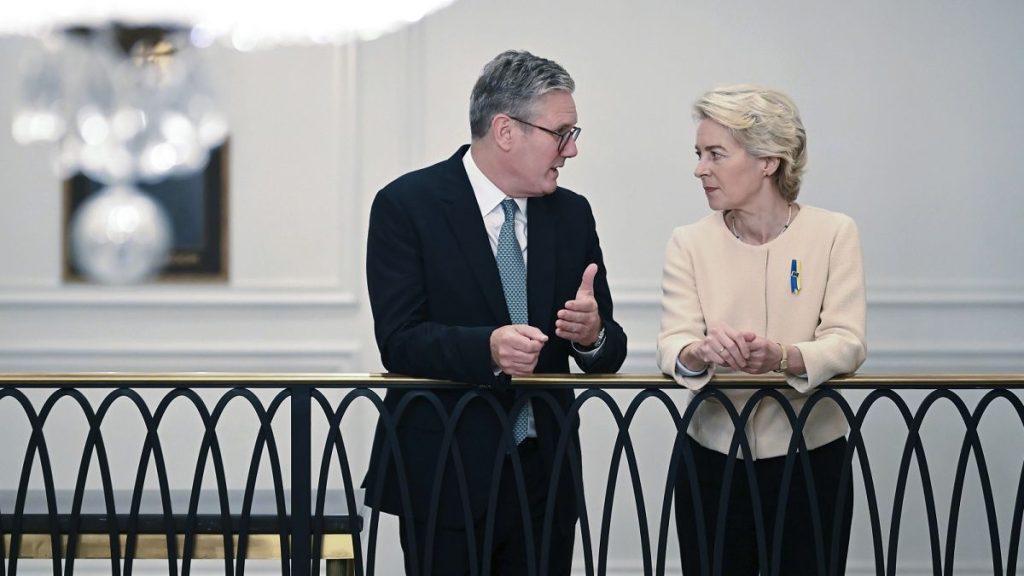A significant new poll reveals a growing desire for closer UK-EU relations amid escalating global uncertainties. The resurgence of Donald Trump and Russia’s ongoing aggression against Ukraine have seemingly prompted a shift in public opinion, with many Britons and Europeans now prioritizing reinforced ties, even if it necessitates compromising previously held “red lines.” The survey, commissioned by the European Council on Foreign Relations (ECFR), highlights a marked preference among Britons for stronger EU relations over ties with the US, a stark contrast to previous sentiments. This desire for closer cooperation extends beyond geopolitical concerns, encompassing areas like migration management, security enhancement, economic strengthening, climate change mitigation, pandemic preparedness, and a more unified stance against global powers like Russia, the US, and China.
Across the Channel, a similar sentiment prevails. Respondents from key EU member states – France, Germany, Italy, Poland, and Spain – largely echo the British view, advocating for closer UK-EU collaboration to bolster European security. This shared perspective underscores a potential for renewed partnership. Remarkably, this convergence of opinion extends to the complex issue of Ukraine. A majority of respondents across the surveyed countries oppose aligning with a potential Trump administration’s pressure on Kyiv to concede ground to Russia, demonstrating a united front against external influence on the Ukraine conflict. Italy, however, presented a more divided stance, with equal proportions supporting and opposing such alignment.
The poll underscores a crucial distinction: while the future of UK-EU relations holds greater significance for British citizens, European publics generally support a re-evaluation of these ties. This public pragmatism contrasts with the often-observed skepticism among EU officials towards granting the UK special treatment. Public opinion appears more open to concessions and mutually beneficial arrangements, such as granting the UK access to EU research programs and certain aspects of the single market in exchange for closer security cooperation. This flexibility stands in contrast to the previously rigid stance of member states and EU officials.
A striking revelation from the survey is the British public’s willingness to accept certain EU regulations in exchange for closer integration. A majority express acceptance of EU phytosanitary rules for privileged single market access, and an even larger proportion endorse reciprocal open borders for free movement of citizens between the UK and EU. This willingness to compromise signals a significant shift in post-Brexit attitudes, potentially paving the way for a more constructive relationship.
The current rapprochement between London and Brussels, initially spurred by the shared response to Russia’s invasion of Ukraine, has primarily focused on defense and energy security. However, the Labour government’s ascension to power in the UK has ushered in a broader “reset” of relations, marked by increased diplomatic engagement. High-level visits by key figures like Prime Minister Keir Starmer, EU Relations Minister Nick Thomas-Symonds, Foreign Minister David Lammy, and Chancellor Rachel Reeves demonstrate a concerted effort to revitalize cooperation across multiple domains.
Chancellor Reeves’ participation in a meeting of EU finance ministers, a significant post-Brexit first, underscores the renewed focus on strengthening economic ties. Her emphasis on the mutual benefits of closer economic cooperation, rejecting a zero-sum game approach, highlights the potential for shared growth and resilience in the face of common challenges like the war in Ukraine, climate change, and high inflation. She argues that Brexit’s negative impact on trade intensity necessitates a deeper economic partnership to bolster both UK and EU economies. This renewed emphasis on economic cooperation signals a departure from previous post-Brexit economic strategies. Ongoing discussions also encompass closer defense cooperation, veterinary agreements, youth mobility, and mutual recognition of qualifications, indicating a comprehensive effort to rebuild and strengthen the UK-EU relationship across multiple sectors. The poll suggests that officials on both sides may underestimate the public’s openness to a closer relationship, potentially paving the way for more ambitious and impactful cooperation.










